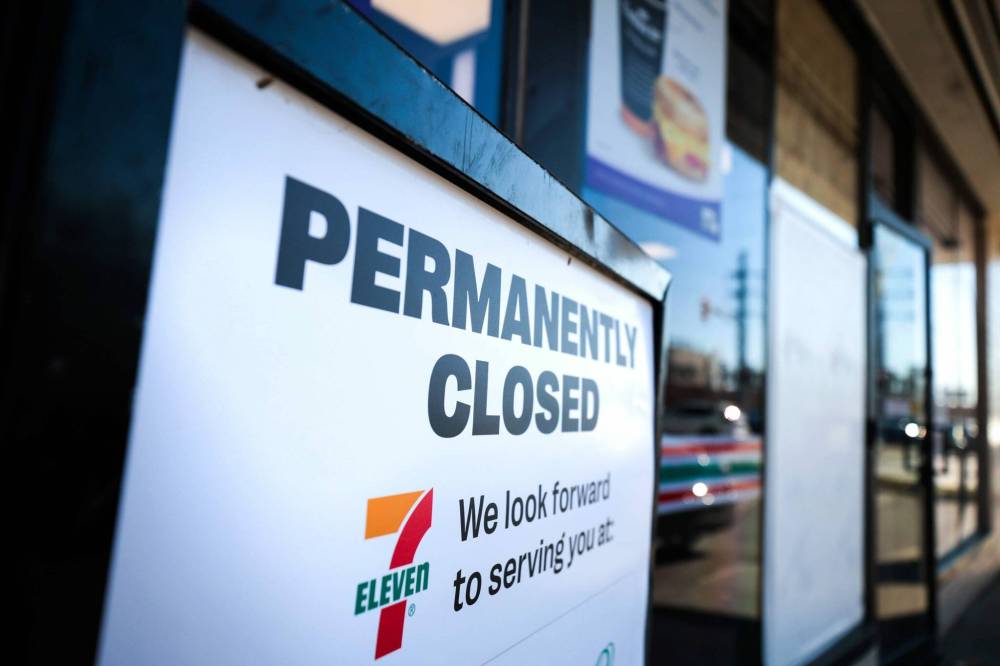Closing retail stores leave an obvious mark
Advertisement
Read this article for free:
or
Already have an account? Log in here »
To continue reading, please subscribe:
Monthly Digital Subscription
$1 per week for 24 weeks*
- Enjoy unlimited reading on winnipegfreepress.com
- Read the E-Edition, our digital replica newspaper
- Access News Break, our award-winning app
- Play interactive puzzles
*Billed as $4.00 plus GST every four weeks. After 24 weeks, price increases to the regular rate of $19.00 plus GST every four weeks. Offer available to new and qualified returning subscribers only. Cancel any time.
Monthly Digital Subscription
$4.75/week*
- Enjoy unlimited reading on winnipegfreepress.com
- Read the E-Edition, our digital replica newspaper
- Access News Break, our award-winning app
- Play interactive puzzles
*Billed as $19 plus GST every four weeks. Cancel any time.
To continue reading, please subscribe:
Add Free Press access to your Brandon Sun subscription for only an additional
$1 for the first 4 weeks*
*Your next subscription payment will increase by $1.00 and you will be charged $16.99 plus GST for four weeks. After four weeks, your payment will increase to $23.99 plus GST every four weeks.
Read unlimited articles for free today:
or
Already have an account? Log in here »
Hey there, time traveller!
This article was published 12/10/2024 (377 days ago), so information in it may no longer be current.
At McPhillips and Mountain in Winnipeg, the parking lot used to boast a towering column with blue flashing lights and a robotic voice that welcomed 7-Eleven customers and warned that the parking lot was under constant video surveillance.
Now, the robot voice has been silenced, the parking lot video unit hauled away and the store windows have been covered in plywood.
At McPhillips and Selkirk, the sign outside the 7-Eleven store that lists the prices at the pump read a stark “0.00” as the price for regular gas on Thursday, because gas isn’t being sold there anymore. Nothing is. By Friday morning, the pumps had been removed, the signage was gone and that store was boarded up, too.

Ruth Bonneville / Free Press
Signs on the windows of 7/Eleven store at 665 McPhillips street at Selkirk Ave.
At Arlington and Ellice, where a backlit would-be customer was trying the doors as recently as Thursday, plywood now reigns.
At all three on Thursday, there had been a telltale hint that they were closed, even in the dark. The rectangular red and blue light-up signs showing the current lottery jackpots for LottoMax and Lotto 6-49 had gone dark.
The closures came after 7-Eleven’s head office warned Winnipeg city councillors during the summer that up to 10 stores were on the chopping block because excessive thefts were making it impossible to operate the businesses safely and profitably.
We’ve written in the space as recently as last week that the problems with retail crime don’t have easy solutions, that they are larger than the simple equation of more police officers making more arrests. That the issues are societal, and include drug addiction and homelessness. Politicians, police and activist alike argue there’s no easy solution, and certainly no quick one. That’s the practical, dispassionate, almost academic way to look at the problem.
But some solution has to be found, because it’s far more than an academic exercise.
Last July, two Giant Tiger stores, one on McPhillips and the other on Main, closed permanently because the stores no longer fit the company’s operating model. The company wasn’t saying theft was part of the reason, but crime statistics for that block saw a dramatic spike in thefts.
The closure of grocery stores — along with convenience stores — reduces the ability of people in the surrounding area to get the things they need. The concept of a grocery desert, where it’s all but impossible to find shopping options for healthy food, or any food, in an immediate area, is a well-known one.
The other thing is that closing businesses doesn’t do anything to solve the overall retail theft problem.
Business owners may have decided — legitimately — that they cannot afford to continue with things as they are. But their departure doesn’t mean the areas where they have been operating get safer or have lower crime rates. It just moves the desperation to another retail — or household — location. Think of it this way: making people show ID at the Liquor Mart may cut down on booze thefts, but it doesn’t effectively reduce shoplifting at the Shopper’s Drug Mart next door.
It’s obvious that closed storefronts are no advertisement for the safety or good management of a city.
In fact, they are a constant reminder that the fabric of civil society is fraying.
Ride the bus, the 71, from Portage to Mountain, and you’ll pass four 7-Eleven locations. Three of them are already closed, and 891 Arlington, the remaining open store, was on the 7-Eleven head office list for possible closure last summer.
The message you get about that 5.7 kilometre trip through the city?
That along that route through Winnipeg, it’s no longer safe enough to sell a Slurpee.
And that’s a hard message indeed.



